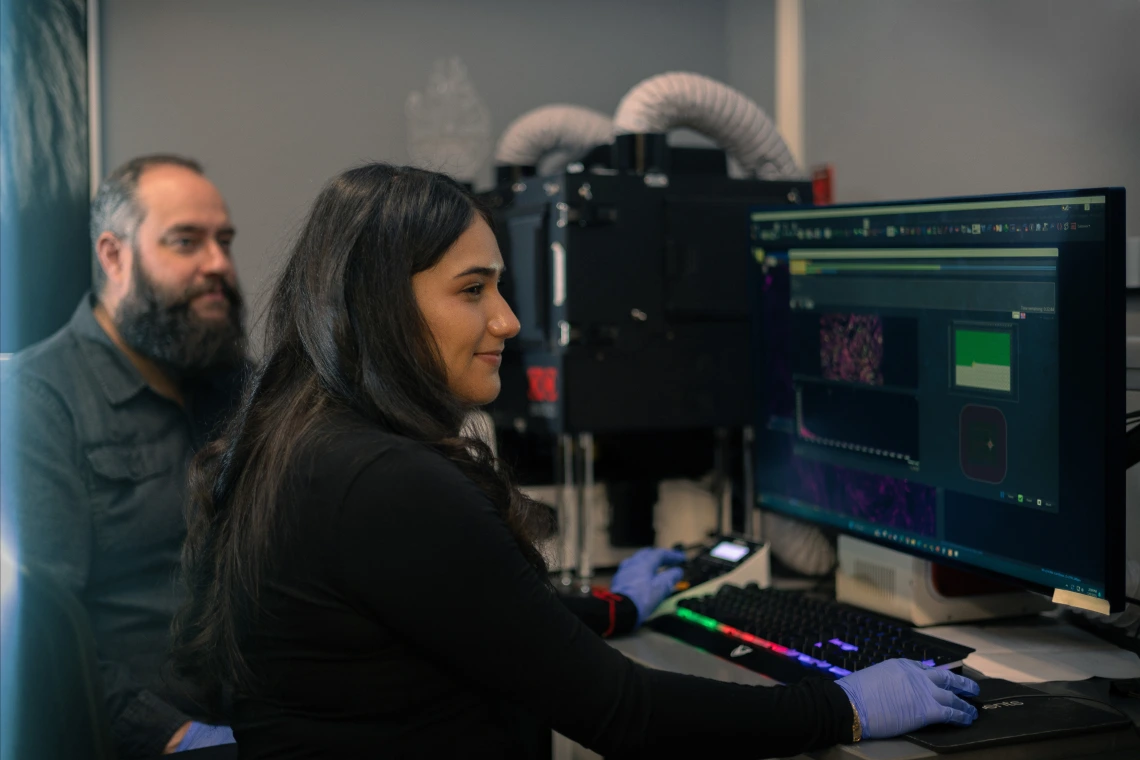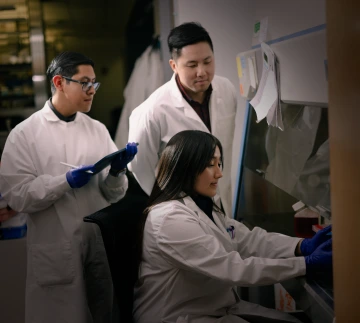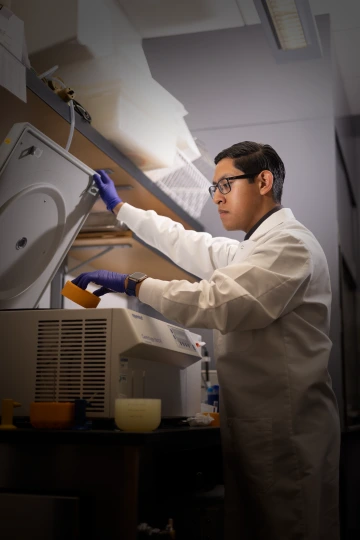Fostering diversity in cancer research

From left, Curtis Thorne, PhD and DICR program graduate Briana Guzman works on a project in the Thorne Lab located in the U of A Cancer Center.
Underrepresented students gain invaluable technical and interpersonal skills through American Cancer Society post-baccalaureate program
“As a first generation college student, I wasn't aware that attending graduate school was even an option,” said Briana Guzman, who earned a bachelor’s degree in molecular and cellular biology from the University of Arizona two years ago. “It all changed in my undergrad when I met a professor who offered me a summer opportunity to work in her research lab and I thought, ‘I didn't even know I could work in research to begin with.’”
Guzman is now a doctoral student in the U of A graduate program in molecular medicine and part of the Thorne Lab under the mentorship of cancer center member Curtis Thorne, PhD, associate professor of cellular and molecular medicine.
Last year, Guzman was one of the first two post-baccalaureate fellows to complete the U of A Diversity in Cancer Research Post-Baccalaureate Fellows Program, called DICR, through the American Cancer Society. Dylan Decker also completed the DICR program and now is a doctoral student in clinical psychology at the University of Montana.
“It's incredibly valuable to the cancer center and to the university as a whole because it takes this raw talent that we have here––these students who are very interested in cancer research and need additional skills––and helps give them the critical skills they need to succeed,” Thorne said.
The DICR program offers fellows two years of paid, full time research experience and provides professional development support that prepares them for their clinical or biomedical doctoral programs.
“I was so thankful that I found this DICR post bacc program here at the U of A,” Guzman said. "It gave me the opportunity and the experience to delve more into research and into the field where I want to spend many years of my life.”
Through DICR, fellows attend conferences and encounter professional development opportunities that help them get into their dream programs, according to Jacob Schwartz, director of the DICR program and associate director for Cancer Research Training and Education Coordination.
“The post baccalaureate program gives the cancer center a chance to grow our workforce in a more efficient way that's better representative of America and of Arizona,” Schwartz said.
According to Schwartz, DICR fellows have an astounding opportunity to choose from 32 U of A experts in cancer research and clinical practice as mentors. He said cancer center members volunteered immediately for mentorship openings.
“The cancer center faculty are passionate about education and passionate about training, and the students in the post baccalaureate program are great,” Schwartz said. “The greatest reward of being a professor and being in academia is to see the success of persons you've trained.”
Some DICR professional workshops included a course in preparing an elevator pitch to assist fellows in explaining scientific work and another on improving their social media presence.
“One thing I was not able to do before the DICR post-bacc program that I'm able to do now is public speaking,” Guzman said. “I never felt comfortable talking about my research in front of an audience. The post-bacc program gave me the opportunity to attend many conferences, and now I'm able to confidently stand up in front of a group and talk about my research.”
Perfecting the program for the U of A Cancer Center

From left, Fidel Saenz and Kellen Chen, PhD, watch Autumn Lester work under a hood in the lab as part of the DICR program.
This year there are two students in the DICR program, Fidel Saenz Jr. and Autumn Lester, who work in the laboratory of Kellen Chen, PhD, assistant research professor in the U of A College of Medicine– Tucson, Department of Surgery and in biomedical engineering.
“As an undergrad, I was very fortunate and got to work in different research labs, but it wasn't easy in the beginning,” Chen said. “I think for a variety of students, giving them that extra opportunity to get funded, work in a research lab and build up to their graduate career is vital.”
Chen said that particularly in his research lab, he values having a diverse group of students, which he thinks fosters creativity in their research goals. He said DICR fellows learn hard skills in the lab and additional soft skills talking to clinicians they typically wouldn't interact with until further in their careers.
“This program really allows us to recruit from those students,” Chen said. “Some of our students also get the opportunity to interact with a lot of our cancer surgeons, talk to them about their projects, and even ask them if they want to collaborate.”
Chen said his favorite part of the mentorship program was meeting and mentoring students like Lester and Saenz.
“They have also opened my eyes to a variety of different aspects of cancer research,” Chen said.
DICR fellow Fidel Saenz Jr. completed his undergraduate studies at Arizona State University in Tempe. He hopes his lab and leadership experience with the DICR will strengthen his U of A doctoral program application so he can become a university researcher teaching in an academic environment.

DICR fellow Fidel Saenz works in the lab of cancer center members Geoffrey Gertner, MD, and Kellen Chen, PhD.
“Through my mentored research, I've experienced graduate level coursework such as cancer biology and physiology,” Saenz said. “I feel that these have really helped me understand more of the details about what I'm doing in the lab. By meeting other students at events who are like me, I've come to the realization that being in a program like this can be beneficial.”
Autumn Lester, a DICR fellow who is a member of the Navajo Nation, also works with Chen and Geoffrey Gurtner, MD, FACS, chair, U of A College of Medicine–Tucson, Department of Surgery and professor of surgery and biomedical engineering.
Lester is also a master’s student in the College of Public Health focused on applied epidemiology. She joined the DICR program after completing her bachelor’s degree in microbiology at Northern Arizona University and working for the Native American Cancer Prevention Program, a 20-year collaboration between U of A and NAU.
“I decided to apply for this program because a lot of my research in the past had been focused on cancer research, specifically with Native Americans. When I was finishing my job, my mentor, Dirk de Heer, brought up doing a post bacc,” Lester said. “I decided to go into this program, which dealt specifically with cancer and where I could contribute my knowledge.”
She said the DICR program is helping to tailor her interests in scientific research to her interest in cancer disparities.
“Being with Dr. Gurtner has exposed me to people practicing medicine doing surgical oncology who are also Indigenous,” Lester said. “They have also shown me that it's possible to do all of this. It's a very niche area, but it is obtainable.”
Lester said the biggest surprise she’s had with the program is that the American Cancer Society director and the cancer center leadership are personally involved with students and consult with them on the program operations.
“I've been in these programs where it's just so huge that the director of these programs doesn’t necessarily know who you are. It was the exact opposite with this program,” Lester said. “I've especially seen that investment with my mentors and the people who also hired us into this program, like Drs. Schwartz and Chen. It been very eye opening to see how much support there is for underrepresented students to achieve in STEM.”



